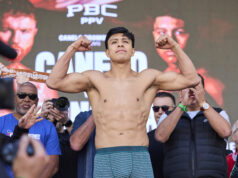By Jimmy Tobin-

Saturday night at Barclay’s Center in Brooklyn New York, Keith “One Time” Thurman won a split decision over Danny “Swift” Garcia adding another alphabet trinket to his collection while doing little to stake his claim to welterweight supremacy. What distinguished Thurman-Garcia was not an interplay of fists, but an absence thereof. Thurman earned the victory because in those early moments when a fight appeared imminent, he seemed most eager to conjure one—and because when he wanted anything but Garcia could not coerce him enough to the contrary.
There were moments of drama between Thurman and Garcia, to be sure. Such moments are near guaranteed every time Thurman steps into the ring, and they came, as they almost exclusively now do in his fights, in the opening rounds. It is in those rounds that Thurman best embodies his moniker, trying to spark opponents with his considerable athleticism and less considerable power, throwing punches with a ferocity that speaks to the sense of performance he does not always honor but always carries within him. Thurman landed a few of those punches on Garcia who, whatever he suffered, responded without a hint of retreat, cranking little semi-circles from his left shoulder, measuring the counter left hooks that would soon enough inter Thurman’s daring.
Garcia proved, rather unsurprisingly, that he could handle whatever evil was delivered in Thurman’s early gusto. The clearer that message became, the more Thurman abandoned his combinations, his connection with the ground when he threw them, and eventually, his commitment to the moment. His chances of a finish quick and spectacular having evaporated, Thurman employed instead a brand of “boxing” antithetical to the reputation he—less convinced and less convincingly—encourages we preserve. If this is what passes for an offensive welterweight, perhaps Floyd Mayweather, who also landed less than fifteen punches a round but was at least skilled enough to stand directly in front of his opponent while doing so, was less a defensive specialist than he is often (disparagingly) remembered as.
For his part, Garcia was hardly better, worse even, if you consider his effort to take the rounds Thurman needed to spare and was willing to concede. Still, he stood his ground against Thurman, as he did against former boogeyman, Lucas Matthysse, digging the balls of his feet into the canvas and committing fearlessly a retort to every Thurman punch.
How undauntedly Garcia stares down daunting power; how quickly does this defiance shake an opponent’s confidence. Garcia is a more complete fighter than Thurman, there is more that is impressive and instructive in his game. But when all he needed were the basics, when a double jab would have won him the rounds Thurman tried to steal with an ill-placed blow and a cloud of smoke, Garcia too often holstered his weapons. If you believe enough of the Thurman narrative, he left an opportunity to distinguish himself in the ring. Garcia left victory there, however, and that mentality will make an opponent of him sooner rather than later.
What is perhaps most frustrating about what transpired is the absence of consequences both fighters stand to face for their performance. This is not to say fighters should be punished for poor performances, at least not exactly. But the lack of fallout for failing to live up to expectations, whether those expectations are the product of promotional ballyhoo or the proclamations of the fighters themselves, is a bit difficult to take. Again Thurman was placed in a position to distinguish himself as the future made present, and instead he was again left speaking laudatorily of his boxing ability (evermore a Thurman euphemism for a night he goes the distance). Garcia merely adds a disputed loss to his trio of disputed victories. He is likely to see little financial penalty despite scaling back his competition again in the aftermath of a loss that, as close as it was, he need waste no one’s time regrouping from. Matchmaking is already too glacial in its pace, and the concept of the comeback feels empty when a defeat carries none of the penalty, physical or otherwise, that need be recovered from.
The hope is that Thurman moves quickly, moves within the next four or five months to an opponent who presents the type of challenge that will not allow him to bore. Again, Thurman is a fighter, and pressed—as he was by Shawn Porter last year—he often responds like one. Whatever his limitations, he appreciates his responsibility to the crowd. And while he is not fighter enough to consistently embrace that responsibility a better opponent might give him no choice but to. For Garcia, there should be only fights that demand he comport himself like a loss means more than simply defeat—no more fights whose outcomes, good or bad, seem to barely register with him. And if that is asking too much of either fighter so too is asking for a charitable assessment of them.







